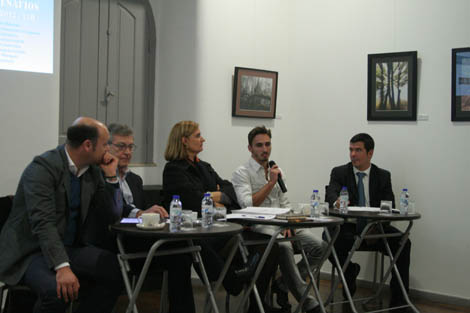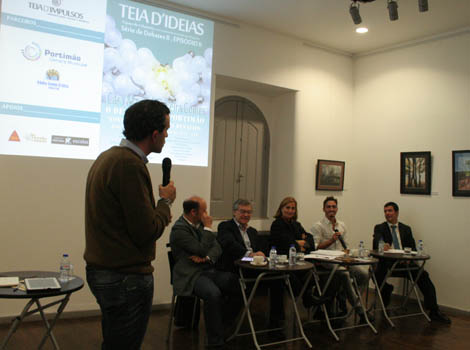 The paradigm of financing sports activity in Portugal has to change, namely separating "what is professional from what is sports training", defended Isabel Guerreiro, councilor for Sports at the Portimão Council, in another gathering of the Teia D'Ideias cycle, promoted by the association Web of Impulses at the Casa Manuel Teixeira Gomes, in Portimão.
The paradigm of financing sports activity in Portugal has to change, namely separating "what is professional from what is sports training", defended Isabel Guerreiro, councilor for Sports at the Portimão Council, in another gathering of the Teia D'Ideias cycle, promoted by the association Web of Impulses at the Casa Manuel Teixeira Gomes, in Portimão.
The mayor added that "it is important to define a national plan with allocation of funds for sports training, as exists for other key sectors such as health or education."
As Isabel Guerreiro defended, sports training should be supported by national investment and withdraw this responsibility from the local authorities, which currently do not have the “necessary capacity to guarantee this support”.
Faced with the question raised by the participants in the gathering about the best profitability of infrastructure, Isabel Guerreiro defended the creation of a regional charter that identifies the means available in the Algarve, in order to encourage their sharing between the different regional clubs.
Fernando Rocha, president of Portimonense, was another guest of this session Teia d'Ideias and presented the current reality of the club, which has 700 federated children and young people doing sports, which corresponds to a considerable proportion of the total of 1500 in the municipality. .
He highlighted the difficulties that Portimonense is going through to continue to exist. "It's difficult to have 700 kids playing sports, because for everything you need money."
 The president of Portimonense was also questioned about the eclectic model of sports clubs, having argued that this model "is not sustainable" and that the policy should include "specialization of clubs in one or a reduced number of sports".
The president of Portimonense was also questioned about the eclectic model of sports clubs, having argued that this model "is not sustainable" and that the policy should include "specialization of clubs in one or a reduced number of sports".
The advantage of this policy is to open space at the local level for the emergence of other clubs with intervention in other sports, which ends up involving more people at local level in the sporting phenomenon, he stressed.
In his speech, Luís Romão~, from the Portuguese Institute of Sport and Youth (IPDJ), analyzed the main challenges facing sports associations today, stressing that it is linked to a model that is not sustainable.
“The dependence on public support was created, in particular municipal support, which nowadays is scarce. The future of associations in this area involves the construction of new webs, creating synergies with a network that ideally covers the entire Algarve», said the official.
The IPDJ can play a key role in this network as "moderator and facilitator of interactions between the different sports agents involved," he added.
Luís Romão also pointed out the importance of these debates to make sports agents reflect together, and it was suggested that this discussion be replicated in other municipalities in the Algarve.
Olympic athlete Pedro Martins, from CHE Lagoense, shared with those present his experience and the challenges he had to overcome to reach this competitive level in Badminton.
The athlete guaranteed that, to achieve these goals in sport, it takes a lot of passion and dedication, many hours of training a day and not always under ideal conditions.
The family is essential to provide support and security to an athlete, especially when they are starting and there are still no results that bring economic and logistical support afterwards, he added.
In the end, Pedro Martins also left a message for the sports directors: «listen to the athletes' opinion, the athletes must have a key word in the decision of the clubs' projects».
José Marques, Tito Januário and Valter Guerreiro, directors of Portinado, Clube Naval de Portimão and Clube Bicross de Portimão, respectively, presented the reality of their clubs, highlighting the daily difficulties they have to deal with in order to make their sporting projects sustainable.
A transversal message was the need to articulate school activities with sports practice for federated athletes, in order to create the necessary conditions for them to be better prepared for competition and ensure better sporting results.
In addition to sports, this Teia D'Ideias also had the participation of the Portimão Municipal Market's Fruit and Fruit Producers Committee, which, together with the Portimão Hotel and Tourism School, colored the debate break with seasonal fruit. in the most different ways.
The 12rd episode of the 3nd edition of Teia d'Ideias is scheduled for December 2, under the theme “Associativism and the City – Together or with their backs turned?”.


















Comments